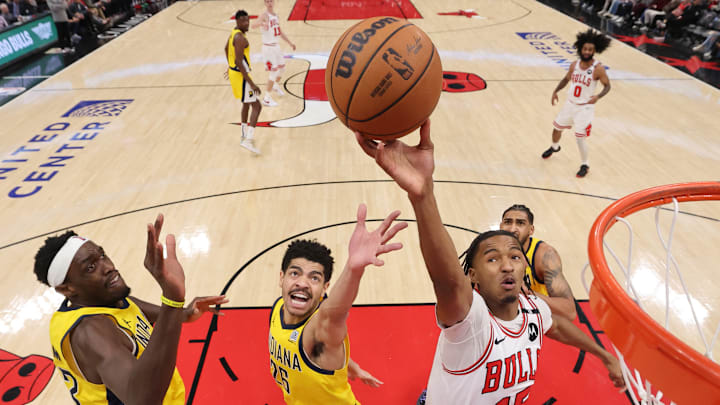Let us preface with the Chicago Bulls are nowhere near contending status. There's plenty of work to do, starting with the continued development of the promising young core. The Bulls' triumvirate of Matas Buzelis (20), Josh Giddey (22), and Coby White (25) exceeded expectations a season ago, especially post-All-Star break.
Still, Chicago finished with a 39-43 record and was embarrassingly bounced from the Play-In Tournament by the Miami Heat. The Bulls are in an era of transition following the trades of respected veterans Alex Caruso, DeMar DeRozan, and Zach LaVine. The focus is now on building a deep team, with, according to Vice President of Basketball Operations Artūras Karnišovas, "9-10 very good players."
Artūras Karnišovas has preached a deep roster
Karnišovas's bizarre roster-building strategy initially received harsh backlash following his brazen post-trade deadline press conference. NBA journalists and reporters were quick to discredit Karnišovas's ideology, posing disputing questions such as, "In NBA history, who are the championship teams with no stars and 9-10 very good players?"
It's not unreasonable to pose such questions. Jayson Tatum and Jaylen Brown aren't considered "very good" players; both are multi-time All-Stars. The same can be said for recent champions Nikola Jokic, Stephen Curry, Giannis Antetokounmpo, Anthony Davis, and LeBron James.
Building a team of 9-10 very good players won't win you a championship. But Karnišovas might still be onto something. The two teams representing each respective conference in this year's NBA Finals, the Indiana Pacers and Oklahoma City Thunder, are incredibly deep.
The Pacers and Thunder exemplify well-rounded rosters
Seven players have appeared in all 16 Pacers' postseason contests. 11 Pacers have seen at least 100 minutes this postseason. Indiana is close to an anomaly. Rick Carlisle has even trotted out various closing lineups amid the Pacers' impressive playoff run. Reserves Obi Toppin, Ben Sheppard, and Bennedict Mathurin have all made game-winning plays in tense situations.
However, the Pacers aren't the only uniquely deep squad—so are the Thunder. Oklahoma City has played eight players in all 16 postseason contests, and 10 have seen at least 100 minutes thus far. Mark Daigneault plays seven players for 22.4 or more minutes per game. The Thunder's depth is a testament to an impressive accumulation of draft picks over the years, which have, in turn, developed into high-impact players.
Both squads benefit from a vast collection of role players, flanked by two All-Stars, which isn't impossible to replicate, especially for the Bulls. Of course, finding a Shai Gilgeous-Alexander, Tyrese Haliburton, Jalen Williams, or Pascal Siakam is no easy task. Gilgeuous-Alexander is the reigning MVP, Haliburton is a two-time All-NBA selection, Williams made his first All-NBA team this past season, and Siakam is a former champion and three-time All-Star.
Only one current Bull has ever made an All-Star appearance: 34-year-old Nikola Vucevic. Chicago's most important players, Buzelis, Giddey, and White, all share one common distinction: an All-Rookie Second Team nod. Not to say the three players will never amount to anything more, but reaching any of Indiana's or Oklahoma City's two best players' peaks is a long shot.
Yet, there's a sense of optimism with how the league has shifted from star-driven to valuing depth and versatility. Chicago doesn't need to attract a horde of stars or nail the draft for consecutive years to be successful. An All-Star ascension from Buzelis and well-articulated draft picks might just be enough to vault the Bulls atop the Eastern Conference. Sure, adding a fortified All-Star would help, but Oklahoma City and especially Indiana's recent success prove roster building isn't what it used to be, favoring the tax-averse, yet salary cap-rich Bulls.
